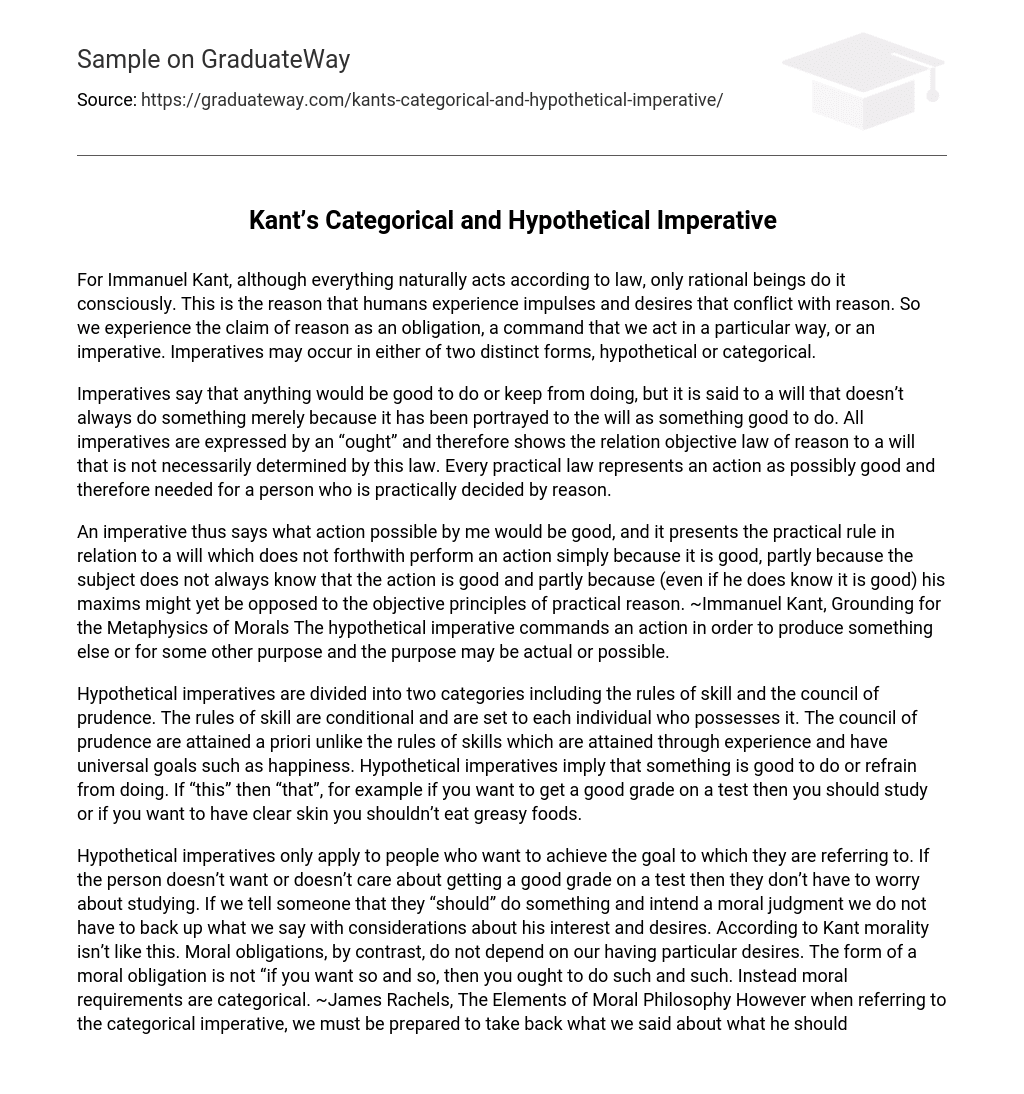Immanuel Kant states that while all things in nature conform to laws, only rational beings do so consciously. This is the reason why humans sometimes experience impulses and desires that contradict reason. As a result, we perceive the requirements of reason as obligations or commands, which are referred to as imperatives. Imperatives can be categorized into two types: hypothetical and categorical.
Imperatives suggest that it is desirable to perform or avoid certain actions, but they do not guarantee that the will always follows what is considered good. Imperatives are expressed by the word “ought,” indicating the objective law of reason’s relationship with a will that may not always be influenced by this law. Practical laws encompass actions that are potentially good and necessary for individuals who are guided by reason.
The text explains that an imperative specifies a good action that is within one’s ability to perform. It provides a practical rule for a will that does not immediately take action solely because it is good. This may be due to the fact that the individual may not always be aware that the action is good, or because their personal principles may contradict objective principles of practical reason. According to Immanuel Kant’s “Grounding for the Metaphysics of Morals,” a hypothetical imperative instructs an action to achieve a specific outcome or for a particular purpose, whether it is a real or potential purpose.
The text explains different types of hypothetical imperatives, namely the rules of skill and the council of prudence. The rules of skill are specific to each individual and are contingent on their possession. On the other hand, the council of prudence is acquired a priori and differs from the rules of skill as it pertains to universal goals, such as happiness. Hypothetical imperatives suggest that certain actions should be taken or avoided. For instance, if you desire a high test grade, you should study; or if you want clear skin, you should avoid eating greasy foods.
According to James Rachels, hypothetical imperatives only apply to individuals who have a desire to achieve a specific goal. If someone lacks interest in getting a good grade on a test, they are not required to study. When we say that someone “should” do something and imply a moral judgment, we do not need to consider their interests or desires. However, Kant’s perspective on morality differs from this. Moral obligations do not rely on personal desires and are categorical rather than conditional. The categorical imperative states that if we realize our guidance on what someone should do was incorrect, we must be willing to retract our statement. Hypothetical imperatives are conditional while categorical imperatives are unconditional. The categorical imperative demands us to perform “X” regardless of the circumstances or outcome; for example, “Thou shall not kill.” Categorical imperatives disregard desires and needs.
Kant proposes three laws of the categorical imperative. The first law is the universal law, which states that individuals must act only according to principles that can be applied to everyone without any exceptions or double standards. Actions like stealing, killing, and lying fail to meet this requirement because they involve denying property rights and individual ownership, which contradicts itself.
Kant’s second law, also referred to as the humanity law or the “end in itself,” emphasizes the importance of treating oneself and others as ends rather than means. According to Kant, every person should be regarded as an end in themselves, not just a tool for achieving objectives. Individuals have their own desires, goals, and intentions and possess the capability to fulfill them. As a result, it is crucial for individuals to honor others’ aspirations while ensuring that their own ambitions do not impede them since all humans are rational beings deserving of respect.
According to Kant, individuals should treat everyone as ends in themselves and not as mere means to their own personal ends, recognizing the equal importance of all individuals. The third law, known as the kingdom of ends law, states that one’s actions should align with a potential kingdom of ends. Acting in accordance with reason and through the will, a person should ensure that their maxims harmonize with this concept.
However, if a woman expects a wealthy man to fulfill all her desires after marriage, she violates this law and gives the impression that her interest lies more in the man as an individual rather than his wealth.
According to Kant, engaging in deceit by feigning a desire for marriage while actually pursuing a sexual relationship is a violation of the law. If the man had been truthful about his intentions, this action would not have taken place. Therefore, Kant argues that the categorical imperative serves as the fundamental principle for all moral obligations. Personally, I have conflicting perspectives on Kant’s concept of categorical and hypothetical imperatives as I find myself in agreement with certain aspects but disagreeing with others.
Although I endorse the idea of fairness and equal treatment for all, I disagree with Kant’s belief that each individual is completely separate. This notion severs the bond between humans and God, placing them above everything else. However, this perspective fails to acknowledge that God serves as the ultimate purpose for human existence, embodying the highest moral principles and possessing supreme authority.





